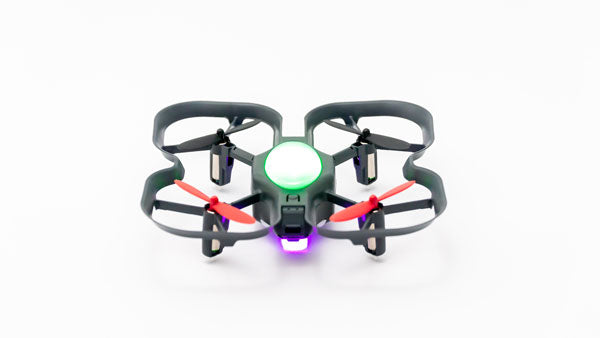Computer science is posing a ________ in such a way that a computer can ____________ it.
Problem, Solve
The only industry that doesn't use computers.
None.
A way at looking at the big picture and seeing how things are connected.
Systems Thinking.

Ozobot
The maker of our 3D printers
Makerbot
The main reasons schools don't offer CS classes.
Teachers can't teach it.
CS majors make $_____________ more than a high school grad over their lifetime.
$1 million dollars
Anything made of parts.
A system.

CoDrone
The part of the 3D printer that actually melts the plastic.
Extruder/print head
One reason it is an important skill to learn.
???
The industry you need to work in.
Any Industry.
a place within a complex system where a small intervention can produce significant, widespread changes
Leverage point.
Parts of the Drone...
Propellers & motors: Provide lift, thrust, and direction.
Sensors: Gyroscope, accelerometer, barometer, infrared sensors for stability and navigation.
Processor (flight controller): Interprets code/commands and sensor data to control movement.
Battery: Powers motors, sensors, and communication systems.
Communication module (Bluetooth/IR): Connects the drone to the student’s controller or laptop.
Frame & body: Holds everything together and protects parts.
LED lights: Give visual feedback during flight (status, mode, errors).
The online tool used to make/ edit objects.
Tinkercad.
This is what Computer Science is all about.
Solving Problems!
The likelihood your future job will use computers.
~100%
Coca-Cola is refreshing, but has a lot of sugar and is not good for you.... is an example of one of these...
Mental model.
Parts of the robot...
Sensors: Detect lines, colors, and codes on paper or screen.
Motors & wheels: Move the robot forward, backward, or turn.
Processor (tiny computer inside): Interprets the sensor data and decides what to do.
Battery: Provides energy for all functions.
LED lights: Give feedback with colors.
Shell/outer case: Protects internal parts.
Parts of the 3D Printer...
Extruder/print head: Heats and melts filament, depositing it layer by layer.
Build plate/print bed: The flat surface where the 3D object is printed.
Filament spool & feeder system: Provides the plastic filament and pushes it into the extruder.
Processor (control board): Interprets digital 3D models (G-code) and directs printer actions.
Motors & belts: Move the print head and build plate along the X, Y, and Z axes.
Sensors: Detect bed leveling, filament flow, and sometimes temperature consistency.
Power supply: Provides electrical energy for heating and movement.
Enclosure (case): Protects the print environment and internal components.
The main reason students are not interested in computer science.
Not exposed to it. No classes offered
Percentage of jobs outside of Tech Companies. (10% 30% 50%)
50%
Another word for emergent behavior of a system.
Consequence.
The cost of the robot or drone?
Ozobot: $175
Drone: $200
One output of the 3D Printer.
3D printed object: The final physical model, prototype, or part.
Movement & sound: Motors and fans generate motion and noise during printing.
Heat: From the extruder and build plate.
Light signals: Status LEDs for printer readiness or errors.
Feedback/data: Printer display or software reports print progress, errors, or completion.